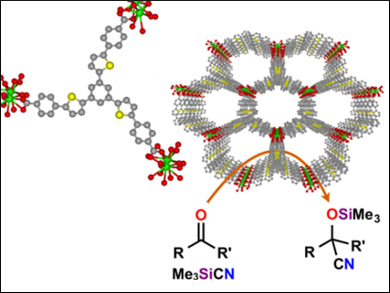Heterogeneous catalysts are useful because of their robustness and the ease of separation from reaction mixtures. Porous coordination polymers (PCPs) or metal–organic frameworks (MOFs) are promising materials for both highly active and selective heterogeneous catalysts, owing to their porosity and modular composition.
Susumu Kitagawa, Kyoto University, Japan, and colleagues have synthesized a series of PCPs which consist of LaIII cations and thiophene-based tritopic organic linkers (pictured). The polymers can act as Lewis-acidic catalysts. While the different La-PCPs exhibited the same type of one-dimensional hexagonal channels, the channel size and the thermal and chemical stability are different, depending on the position of thiophene substituent in the three organic linkers.
The catalytic activity of the La-PCPs in the Lewis-acid-catalyzed cyanosilylation of carbonyl compounds was among the highest reported so far for PCPs. The highest activity was observed for the La-PCP with the largest channels, indicating enhanced molecular diffusion into the channels.
- Design and Synthesis of Porous Coordination Polymers with Expanded One-Dimensional Channels and Strongly Lewis-Acidic Sites,
Takashi Kajiwara, Hideyuki Higashimura, Masakazu Higuchi, Susumu Kitagawa,
ChemNanoMat 2017.
DOI: 10.1002/cnma.201700256




